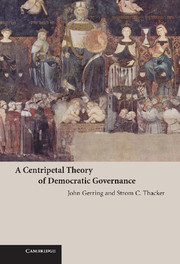Book contents
- Frontmatter
- Contents
- List of Figures
- List of Tables
- Acknowledgments
- A Centripetal Theory of Democratic Governance
- 1 Models of Governance
- PART ONE CAUSAL MECHANISMS
- PART TWO EMPIRICS
- PART THREE CONCLUSIONS
- 8 In Defense of Grand Theory
- Appendix A Defining Good Governance
- Appendix B Alternative Theories Revisited
- Sources
- Author Index
- Subject Index
8 - In Defense of Grand Theory
Published online by Cambridge University Press: 06 July 2010
- Frontmatter
- Contents
- List of Figures
- List of Tables
- Acknowledgments
- A Centripetal Theory of Democratic Governance
- 1 Models of Governance
- PART ONE CAUSAL MECHANISMS
- PART TWO EMPIRICS
- PART THREE CONCLUSIONS
- 8 In Defense of Grand Theory
- Appendix A Defining Good Governance
- Appendix B Alternative Theories Revisited
- Sources
- Author Index
- Subject Index
Summary
In recent years, a growing corpus of work within the disciplines of political science and economics has focused on the causal effect of political institutions on the quality of governance. Having fallen into desuetude for nearly a century, the concerns of eighteenth- and nineteenth-century political commentators like Rousseau, Bentham, Bagehot, Bryce, Lowell, and Wilson – not to mention classical writers such as Aristotle – are once again front and center. This is driven in part by a renewed theoretical interest in the role of institutions in structuring behavior (the “new institutionalism”). But it is also motivated by a more specific question: what role might basic-level political institutions play in fostering political, economic, and human development? The general assumption, as framed by James Buchanan, is that “constitutions and constitutional structure are the instruments through which reforms must be effected if ultimate improvements in patterns of political outcomes are to be expected.”
Yet within this burgeoning literature there have been few attempts to systematically test, and theorize, the impact of democratic institutions across a wide range of policies and policy outcomes. Usually, writers limit themselves to a single political institution and a single outcome – one X/Y relationship, with the usual ceteris paribus conditions. Thus, scholars might explore the role of electoral systems in structuring party systems or trade policy outcomes, but not both (much less a wider range of outcomes).
- Type
- Chapter
- Information
- A Centripetal Theory of Democratic Governance , pp. 157 - 164Publisher: Cambridge University PressPrint publication year: 2008



